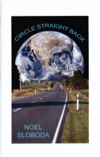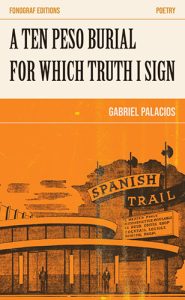Circle Straight Back
Noel Sloboda released two chapbooks from different presses in 2012. His screen-printed, stanza-form chapbook, So Below (sunnyoutside, March 2012) contains four short poems and a deftly made two-color fold-out. Unlike So Below, the other chapbook of prose poems, Circle Straight Back, is sparse and unadorned. The effect is matter-of-fact, archival, and unsentimental. This seems an appropriate device for poetry of subtle misery and overt tragedy. It is certainly a theme running through the text. From the first poem, “Birth of Tragedy,” to the end of a species in “Of Species,” the threads of death, destruction, tragedy, and disappointment prevail.
Noel Sloboda released two chapbooks from different presses in 2012. His screen-printed, stanza-form chapbook, So Below (sunnyoutside, March 2012) contains four short poems and a deftly made two-color fold-out. Unlike So Below, the other chapbook of prose poems, Circle Straight Back, is sparse and unadorned. The effect is matter-of-fact, archival, and unsentimental. This seems an appropriate device for poetry of subtle misery and overt tragedy. It is certainly a theme running through the text. From the first poem, “Birth of Tragedy,” to the end of a species in “Of Species,” the threads of death, destruction, tragedy, and disappointment prevail.
Sloboda’s twenty-four short prose poems/flash fiction pieces turn their attention to the tragic through a series of comical, absurd, observational, sardonic, and illustrational lenses. It is a full spectrum approach to examining the emotions of disaster’s edge. “Circles” hints at the dark side of human behavior while taking a more light-hearted approach to its discussion. “Out of Line” is an examination of our hopeless position in life through the thoughts and actions of a fence. This absurd point of view is not exactly effective, yet the message of pointlessly trying to assert one’s self is an excellent visual metaphor, if a depressing one. “The Artist” examines disappointment while creating an iconic visual image of the mundane. The character fights off chaos as he walks half a dozen dogs around the neighborhood. I see the dogs fanned out before him, pulling hard on the leashes while he braces against each step of the walk, “driving against destiny.”
“I heard a faint song of hope and loss in those jangling keys,” Sloboda says in “Eastern Romance.” The “faint song of hope” comes through in poems like “From the Garden,” where the author exalts what violence cannot destroy. The song is faint, but can be found in even the most unrealistic situations. Take “Ecstasy,” for example. From the title we might imagine a beautiful image or experience awaiting us. Instead, we are greeted with a hearty hangover, a permanently sealed bottle of what we desire most, vodka, and a break-up note from ourselves:
“Dear Fritz,” it began, “I am writing to you for the last time, for your own good. After some deliberation, I have decided I can’t allow us to be associated any longer. You’re simply too much of a milquetoast when sober. A few slugs and you become tolerable. Yet no matter how much you drink, you always return, sooner or later, to being sober. I can’t bear it any longer, waking up, in my own bed, knowing who I am. Being you. Therefore—as you will have probably discovered—I am severing ties. I have arranged for alcohol to be inaccessible to you. Please, do not try to follow me; I won’t be crawling inside you ever again; I am moving on to better things. Yours, less or more, Fritz.”
Like Sartre’s hell, Fritz’s hell is a mundane inferno we cannot undo. So, why name it “Ecstasy”? Ironically, the poor, sad character, Fritz, has also been freed from pursuing the addiction that torments him; it is a classic moment when the alcoholic is freed from the complex control alcohol has over his life.
Circle Straight Back does not convince us of its extensive knowledge of tragedy through elegant language, merely through repetition and variety. It is clear Sloboda thinks about suffering, even as he occasionally can make light of it. As a reader, I found this approach compelling, but insufficient for a book of poetry. I can imagine a different reader glad to be immersed in clever stories of tragedy, but for me, a great line will suffice.





